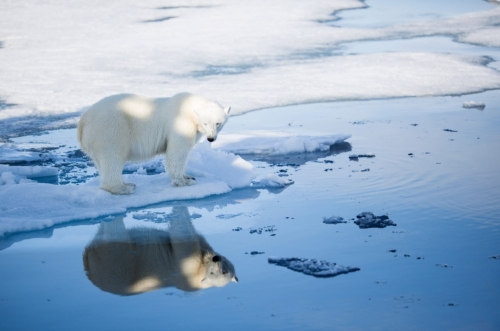- Joined
- Jan 28, 2013
- Messages
- 94,823
- Reaction score
- 28,342
- Location
- Williamsburg, Virginia
- Gender
- Male
- Political Leaning
- Independent
[h=2]Sea ice melt in the Arctic Basin leaves an area for polar bears larger than Greenland[/h]Posted on August 29, 2019 | Comments Offon Sea ice melt in the Arctic Basin leaves an area for polar bears larger than Greenland
Most polar bears that spend the spring feeding in the peripheral seas of the Arctic Basin (such as the Beaufort, Chukchi, Kara, and Barents Seas) remain on the persistent pack ice of the central Arctic during the summer and this August, that refugium is still larger than Greenland. Most of these bears do not use this July-September Arctic Basin ice as a hunting platform unless they are very lucky: the few seals available are hard to catch. For the most part, polar bears fast or eat very little during the summer whether they are on land or on ice (see references in this post).

Since early June, sea ice experts have been wringing their hands over the melting of Arctic sea ice and offering breathless speculation that this year’s September minimum could be – gasp! – as low as or less than 2012 or even less. But now, as the graph of ice cover at 28 August shows below, that outcome is looking not just unlikely but virtually impossible (the blue line is 2019 extent, red dashed line is 2012, and the brown line is 2016):

As expected, the failure of the ice to remain on track to set a new recordSeptember low due to global warming is shrugged off with a reminderthat summer ice extent “is sensitive to changes in daily weather conditions.”
Continue reading
Most polar bears that spend the spring feeding in the peripheral seas of the Arctic Basin (such as the Beaufort, Chukchi, Kara, and Barents Seas) remain on the persistent pack ice of the central Arctic during the summer and this August, that refugium is still larger than Greenland. Most of these bears do not use this July-September Arctic Basin ice as a hunting platform unless they are very lucky: the few seals available are hard to catch. For the most part, polar bears fast or eat very little during the summer whether they are on land or on ice (see references in this post).

Since early June, sea ice experts have been wringing their hands over the melting of Arctic sea ice and offering breathless speculation that this year’s September minimum could be – gasp! – as low as or less than 2012 or even less. But now, as the graph of ice cover at 28 August shows below, that outcome is looking not just unlikely but virtually impossible (the blue line is 2019 extent, red dashed line is 2012, and the brown line is 2016):

As expected, the failure of the ice to remain on track to set a new recordSeptember low due to global warming is shrugged off with a reminderthat summer ice extent “is sensitive to changes in daily weather conditions.”
Continue reading




